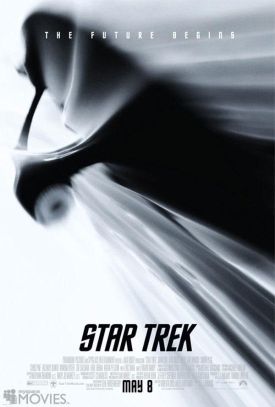The Triumph of Fantasy
From The American Spectator.
August 27, 2009.
|
As I was sitting in my local cineplex and waiting, not very hopefully, for the new Star Trek movie to begin, I watched in the space of about ten minutes seven separate previews of coming attractions, all of which are on the summer blockbuster schedule and most of which will have opened by the time you read these words. Here, in order, is what they advertised:
- an animated feature produced by Tim Burton called 9 featuring cute, goggle-eyed, animated humanoids battling giant machines which is set in a post-apocalyptic world and opens, barring an intervening apocalypse, on September 9th — 9-9-09;
- Land of the Lost, a comic-adventure with Will Ferrell, based on a ‘70s TV series and involving time travel to a world filled with dinosaurs;
- another comedy-adventure by Harold Ramis called Year One in which Michael Cera, Jack Black and others show us the allegedly comic truth behind a number of Biblical and other ancient legends;
- Terminator Salvation, another post-apocalyptic romp with Christian Bale, who is supposed to be what Edward Furlong in the last Terminator turned into; its tag could serve for any of these movies: "Forget the Past";
- the sequel to Night at the Museum (2006), subtitled Battle of the Smithsonian, which copies its predecessor in making a museum’s exhibitions come to raucous life once it is closed;
- G.I. Joe: The Rise of Cobra in which the patriotic doll also comes to life as a whole co-ed "élite force" fighting for an international organization against an arms dealer; the striking line from the trailer is: "When all else fails, we don’t";
- and, finally, Transformers: Revenge of the Fallen, also based on a child’s toy and involving space travel and warring robots.
Now what do these seven movies all have in common, both with each other and with Star Trek, which followed them? All were the most childish sorts of fantasy attended by audiences that were mostly, at least chronologically, adult. Yet anyone venturing to suggest that our children’s exposure to this Niagara of nonsense throughout their formative years might be detrimental to them is likely to be seen as a religious nut.
You don’t have to be religious, however, to question the general assumption that fantasy is harmless or even healthy, and indistinguishable from such self-evidently salutary fictions as Greek myth or Biblical legend. The new Star Trek, says Manohla Dargis in The New York Times is, among other things, "a testament to television’s power as mythmaker, as a source for some of the fundamental stories we tell about ourselves, who we are and where we came from." The original TV series, she adds, was also "a utopian fantasy of the first order" — as if this were entirely consistent with the alleged "myth" she had just described. And, in a way, I suppose it is, for utopianism is by its very nature a form of fantasy and one which, as I pointed out in this space last month, is enjoying a certain intellectual vogue of its own. For the many who now suppose that "the American dream" is a form of utopianism, I guess it is "where we came from."
But if Star Trek, the movie, is to be counted among those "fundamental stories," it’s hard to see how it suggests anything real about who we are or where we came from — unless who we are turns out to be intergalactic half-breeds, while where we came from is alternate universes where the familiar orderings of this one are at best haphazard. Myth is generally supposed to embody some kind of truth about the world, but I have not yet seen it explained by Ms Dargis or any of the other critics who gave Star Trek a rave what truth it contains, beyond the most banal, nor any acknowledgment that the absence of such truth counts as a detraction from this or any of the other new legends’ mythic power.
A day or two earlier, I had spent an unhappy evening at the theatre watching the Washington Shakespeare Company’s painfully unfunny revival of Noël Coward’s 1931 comedy, Design for Living. This, too, was a utopian fantasy, reeking of the now-dated revolutionary sensibility of the 1930s. How could anyone take seriously, even as comedy, a giddy representation of the Bright Young Things of the period re-inventing marriage and morality as if this were a thing unheard of? And yet the noticeably elderly audience laughed and clapped heartily all the way through the sorry spectacle. Perhaps these people were old enough to remember when the jokes still sounded fresh and, well, daring. As it seemed improbable to me that they could have been laughing at them qua jokes, I guessed that there was an element of nostalgia, too, of reliving their youth in the ‘40s and ‘50s when the remembered naughtiness of the ‘20s and ‘30s seemed, as Star Trek does today, like good, harmless fun.
Yet fantasy is not always harmless. Here, for example is Gideon Rachman in The Financial Times, apologizing for President Obama’s apologies on behalf of America and noting that "Mr Obama’s willingness to acknowledge past American errors is a sign of strength, not of weakness." He offers no evidence for this remarkable assertion. The word "sign" suggests that he is writing about a form of communication, as does his recognition that "when Mr Obama suggests that the US has made mistakes in its dealings with Europe or the Muslim world, he is quite deliberately sending a signal." But there is nothing to support the implication that the signal, as received, is one of strength rather than weakness. Instead, he merely notes that "a willingness to discuss your country’s history self-critically is a mark of an open society."
Well, so it is. But what has that got to do with signaling either strength or weakness? What he means, presumably, is that in his own mind and the minds of other liberal-minded people an open society is better than a closed one (like Russia or China, which are the two examples he gives) and, therefore, somehow, it must also be stronger. This is sloppy thinking but sloppy thinking of a particular kind: namely, fantasy. As far as Mr Rachman is concerned, the fact that neither Russia nor China nor any other country he can name will read the signal as he reads it is not a relevant consideration. He wants to believe that openness equals strength, and therefore, to him, it does.
 | | His exercise in solipsism reminded me of what I still think of as the most revealing of President Bill Clinton’s remarks. When he was told that not retaliating for some terrorist outrage or other would make us look weak, Bill replied, according to Bill himself in self-congratulatory vein: "Can we kill ‘em tomorrow? Because if we can kill ‘em tomorrow, we’re not weak." He, too, in other words, had mixed up a private mental state — that is, his personal consciousness of the potential of American power (very strong) — with the way someone else was likely to perceive his failure to exercise that power, that is, as an indication of weakness. He, too, preferred to live in his fantasy world.
Doubtless it is very unfortunate that we live in such a wicked world that people, particularly when they regard one another with the kind of suspicion that attends the relationship of rival powers, so often tend to regard kindness, gentleness, forbearance and self-criticism as indicative of weakness while violence, force, vengefulness and invincible self-confidence indicate strength, but what are you going to do? Well, what both the Presidents Barack and Bill as well as Gideon Rachman are going to do — and are proud to tell us they are going to do — is to pretend that it isn’t so. That, too, is a sign of strength in their book. Nowadays, it’s not just those who can afford to live inside their own heads but even political and military leaders, people who have to deal with matters of life and death in the real world, who feel entitled to be the kind of fantasists that Star Trek and half the movies made today are designed to appeal to.
Can it be, then, only coincidental that their flights of fancy take place in the popular cultural context of a steady diet of fantasy, fantasy and more fantasy? Could the President’s assurances that pouring trillions of dollars into federalized health care will actually save us money or that raising taxes on domestic oil and gas production will help us toward "energy independence" or that, for that matter, "torture doesn’t work" and therefore can never force us to a choice between our ideals and our safety — could these and other fantasies have passed unnoticed and uncriticized as they mostly have in the media and other public forums for political debate if we lived in a culture inclined to be at all critical of fantasy? I’m only asking. 
[Top][Back]
|



